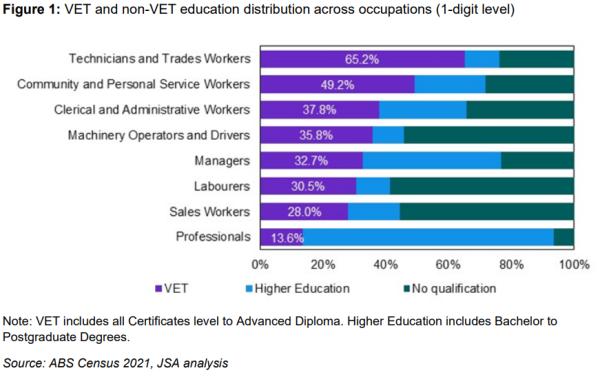Blog: VET Opens Up New Pathways Into High Demand Jobs
Written by Cara Jenkin
More than half of all new jobs created have required a vocational education and training qualification, as the labour market relies on the practical and real-world teaching style that VET provides to skill staff.
Jobs and Skills Australia reports that in the year to February, 2023, more than 60 per cent of total employment growth nationally was in VET-related occupations.
Jobs growth was not just limited to trades but across all occupational groups.
Meanwhile, 36 per cent of all employment growth was in occupations in which a university qualification is the primary pathway.
The remaining new jobs created did not require a qualification.
VET wasn’t the first choice Leela Subramaniam, 26, made after finishing high school but it is one that she now wishes she had selected.
However, university seemed like her only option, as vocational education and apprenticeships were not something that she had ever really heard about.
“I left school thinking I wanted to be a lawyer but I didn’t really,” she says.
“There was of a lot of pressure from my parents to take that career pathway.
“A year and a half into my degree, I was doing really badly, I was failing a few subjects, things like that.
“It just wasn’t really my learning style. I think I’m more of a hands-on person.”
RELATED: Nathan Kettle’s story
Her father’s death caused her to step away from study, so she shifted her focus to one of her three hospitality jobs that she had to support herself through university.
It led to her starting as a cook at a café, where she learned about apprenticeships.
“That’s how I got into vocational education,” she says.
“I’d never really heard of the apprenticeship or thought anything of it – only really tradies and things like that in school.
“Because I wasn’t shown another pathway as well, (university) just seemed like the only option.
“I never really thought I would be a chef because I was really trying to be a bit more book smart I think.
“I didn’t know really much about VET or the difference (in study areas), but looking back, I always think I would have been qualified so much sooner if I had known.”
The Shared vision, equal pathways report, completed for the Federal Parliament’s inquiry into the perceptions and status of vocational education and training this year, reveals 4.5 million people were enrolled in vocational education and training (VET) in 2022, up 5.1 per cent on the previous year.
The number enrolled is equal to about 25 per cent of the population aged between 15 and 64 and compares to 1.55 million people who were enrolled in university and 1.79 million people enrolled in secondary school.
“The National Union of Students (NUS) observed that over the five years between 2016 and 2021, VET enrolments increased by 177,000 while university enrolments increased by 25,000,” the report states.
“The NUS stated that this demonstrates that VET remains ‘extremely relevant’ to people wanting to increase their skills to enter the workforce.”
Trades workers and technician jobs have the highest requirement for VET qualifications, with the Jobs and Skills Australia data revealing 65.2% of all people employed in the occupation hold at least one as their highest level of education.
More than a third of people employed as community and personal services workers, clerical and administrative workers and machinery operators and drivers also cite VET as having provided the highest level of education they require for their job.
More than a quarter of managers, labourers and sales workers also rely on VET.
While professionals have the highest rates of university qualifications of all occupational groups, 13.6% of them still have VET as their highest level of education.
National Centre for Vocational Education Research statistics also show that trades are not the most popular vocational education and training course that students enrol in, proving the range of options that VET offers.
The most popular subject being studied by students is management and commerce, with one in five (20%) of all VET students enrolling in this area.
Society and culture was the second-most popular subject area (18.3% of enrolments) followed by engineering and related technologies (17.5%), architecture and building (9%) and food, hospitality and personal services (8.9%).
BuildSkills Australia is one organisation with data confirming that vocational education and training provides a broad role in skilling its workforce.
It finds a record number of people in the construction, property and water industries are studying vocational education and training qualifications.
“Right now, there are more than 300,000 enrolments in a built environment vocational education training program, including almost 76,500 apprentices and trainees,” chief executive officer Brett Schimming says.
“Approximately 57,000 of these participants are studying carpentry, making it the most popular course and by a significant margin.
“The second most popular course is for aspiring real estate agents, with more than 30,000 people enrolled in a Certificate IV in Real Estate Practice.
“This makes a lot of sense, with Australia’s demand for housing continuing to increase, we’re seeing more and more people wanting to learn how to build and learn how to sell houses.”
Rounding out its top five courses are civil construction plant operations (23,000 students), building (22,500 people pursuing a course) and plumbing (21,500 students).
RELATED: Joshua Morrissey’s story
Nationally, a certificate III is the most common VET qualification undertaken, with 41.5% of all students enrolled in it.
But almost the same proportion are studying higher level qualifications, such as a certificate IV (20%) or a diploma or advanced diploma (15%).
Leela obtained a Certificate III in Commercial Cookery through her mature-age apprenticeship and works at Flinders Hotel on Victoria’s Mornington Peninsula.
When Covid-19 pandemic lockdowns prevented her from working, she decided to return to university study but in a way that will help her new-found career.
She was accepted into a Bachelor of Business – without needing an ATAR or bridging course – which she has completed online and part time.
“It links a lot to hospitality – running a restaurant, people skills, all that kind of stuff,” she says.
Leela’s cookery skill also has been recognised via the Australian Training Awards and other industry competitions, which includes participating in the 2024 World Federation of Colleges and Polytechnics Congress in Jamaica and a scholarship to train in a Michelin star restaurant overseas.
“I’m pretty happy with how things have turned out,” she says.
“For me, VET has been a game changer because it gave my life a sense of direction and a pathway that I love and never would have thought of.
“I always think that all the opportunities I’ve gotten and things like the scholarship, the international awards, I wouldn’t have had that if I was still studying law and commerce at uni.
“I’ve been able to find a career that I love, that suits my learning style, and kind of intertwines now with me being able to find my passion for business too.”
TO GET CAREER IDEAS AND LEARN ABOUT STUDY AND TRAINING PATHWAYS THAT SUIT YOUR PASSIONS, VISIT MYFUTURE.EDU.AU
 Cara Jenkin is a freelance journalist with more than 20 years’ experience working in the print, digital and television media. It included 10 years as the editor of NewsCorp’s Careers employment section, covering topics ranging from education and training to workplace career advice.
Cara Jenkin is a freelance journalist with more than 20 years’ experience working in the print, digital and television media. It included 10 years as the editor of NewsCorp’s Careers employment section, covering topics ranging from education and training to workplace career advice.

